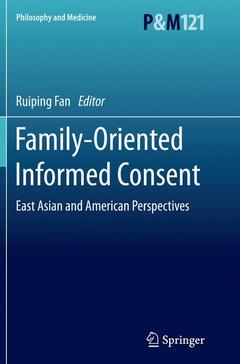Description
Family-Oriented Informed Consent, Softcover reprint of the original 1st ed. 2015
East Asian and American Perspectives
Asian Studies in Bioethics and the Philosophy of Medicine Series
Coordinator: Fan Ruiping
Language: English
Subject for Family-Oriented Informed Consent:
Publication date: 10-2016
Support: Print on demand
Publication date: 03-2015
288 p. · 15.5x23.5 cm · Hardback
Description
/li>Contents
/li>Comment
/li>
I. Dependency, Autonomy, and the Role of the Family.- 1. Dependency, Decisions, and a Family of Care; Jeffrey P. Bishop.- 2. Individually Directed Informed Consent and the Decline of the Family in the West.- Mark J. Cherry; 3. Family and Autonomy: Towards Shared Medical Decision-Making in Light of Confucianism; Jue Wang.- II. Informed Consent: Individual-oriented vs. Family-oriented.- 4. The Ideal of Autonomy and Its Misuse; Kyungsuk Choi.- 5. The Confucian Alternative to the Individual-Oriented Model of Informed Consent: Family and Beyond; Kam-por Yu.- 6. The East Asian Family-Oriented Principle and the Concept of Autonomy; Lawrence Yung.- III. Family Consent in End-of-life Decision Making.- 7. Family Consent in Medical Decision-Making in Taiwan: The Implications of the New Revisions of the Hospice Palliative Care Act; Shui Chuen Lee.- 8. Filial Duty as the Moral Foundation of Caring for the Elderly: Its Possibility and Limitations; Ilhak Lee.- 9. End-of-life Decision Making in Hong Kong: The Appeal of the Shared Decision Making Model; Ho Mun Chan, Doris M.W. Tse, Kam Hung Wong, Julian Chuk-Ling Lai, Chun Kit Chui.- IV. Risk Assuming, Organ Donation, Medical Research and the Family.- 10. Families and Medical Decisions to Assume Risks for the Benefit of Others; Ana Iltis.- 11. On Family Informed Consent in the Legislation of Organ Donation in China; Yu Cai.- 12. The Informed Consent of Human Medical Research in Mainland China: A Family-Based Binary Decision Model; Rui Deng.- V. Family Shared Decision Making, Truth Telling, and Advance Directives.- 13. Toward a Shared Decision: Against the Fiction of the Autonomous Individual; Ryan Nash.- 14. A Confucian Worldview and Family-Based Informed Consent: A Case of Concealing Illness from the Patient in China; Wenqing Zhao.- 15. Towards a Good Practice of Family-Oriented Consent: Reflections on Medical Practice in Taiwan; Hon Chung Wong.- 16. A Family-Oriented Confucian Approach to Advance Directives in End-of-Life Decision Making for Incompetent Elderly Patients; Yaning Yang.- VI. Epilogue.- 17. Families and Individuals in Medical Decision Making; Lisa M. Rasmussen.- Notes on Contributors.- Index.
Critically explores the current individually oriented approach to informed consent
Draws on both East Asian moral resources as well as a critical response to the ways in which the informed consent has developed in the US
Discusses the importance of family-oriented approaches to informed consent?




